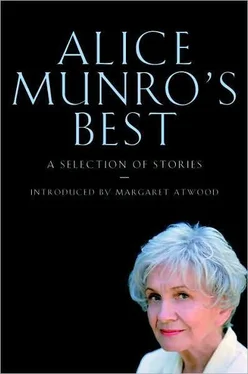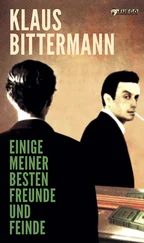“Do you want me to phone Peggy?” I said. Peggy is my sister. She is married to an astronomer and lives in Victoria.
He thought about it. “I guess we ought to tell them,” he said finally. “But tell them not to get alarmed.”
“All right.”
“No, wait a minute. Sam is supposed to be going to a conference the end of this week, and Peggy was planning to go along with him. I don’t want them wondering about changing their plans.”
“Where is the conference?”
“Amsterdam,” he said proudly. He did take pride in Sam, and kept track of his books and articles. He would pick one up and say, “Look at that, will you? And I can’t understand a word of it!” in a marvelling voice that managed nevertheless to have a trace of ridicule.
“Professor Sam,” he would say. “And the three little Sams.” This is what he called his grandsons, who did resemble their father in braininess and in an almost endearing pushiness — an innocent energetic showing-off. They went to a private school that favored old-fashioned discipline and started calculus in Grade 5. “And the dogs,” he might enumerate further, “who have been to obedience school. And Peggy…”
But if I said, “Do you suppose she has been to obedience school too?” he would play the game no further. I imagine that when he was with Sam and Peggy he spoke of me in the same way — hinted at my flightiness just as he hinted at their stodginess, made mild jokes at my expense, did not quite conceal his amazement (or pretended not to conceal his amazement) that people paid money for things I had written. He had to do this so that he might never seem to brag, but he would put up the gates when the joking got too rough. And of course I found later, in the house, things of mine he had kept — a few magazines, clippings, things I had never bothered about.
Now his thoughts travelled from Peggy’s family to mine. “Have you heard from Judith?” he said.
“Not yet.”
“Well, it’s pretty soon. Were they going to sleep in the van?”
“Yes.”
“I guess it’s safe enough, if they stop in the right places.”
I knew he would have to say something more and I knew it would come as a joke.
“I guess they put a board down the middle, like the pioneers?”
I smiled but did not answer.
“I take it you have no objections?”
“No,” I said.
“Well, I always believed that too. Keep out of your children’s business. I tried not to say anything. I never said anything when you left Richard.”
“What do you mean, ‘said anything’? Criticize?”
“It wasn’t any of my business.”
“No.”
“But that doesn’t mean I was pleased.”
I was surprised — not just at what he said but at his feeling that he had any right, even now, to say it. I had to look out the window and down at the traffic to control myself.
“I just wanted you to know,” he added.
A long time ago, he said to me in his mild way, “It’s funny. Richard when I first saw him reminded me of what my father used to say. He’d say if that fellow was half as smart as he thinks he is, he’d be twice as smart as he really is.”
I turned to remind him of this, but found myself looking at the line his heart was writing. Not that there seemed to be anything wrong, any difference in the beeps and points. But it was there.
He saw where I was looking. “Unfair advantage,” he said.
“It is,” I said. “I’m going to have to get hooked up too.”
We laughed, we kissed formally; I left. At least he hadn’t asked me about Nichola, I thought.
THE NEXT AFTERNOON I didn’t go to the hospital, because my father was having some more tests done, to prepare for the operation. I was to see him in the evening instead. I found myself wandering through the Bloor Street dress shops, trying on clothes. A preoccupation with fashion and my own appearance had descended on me like a raging headache. I looked at the women in the street, at the clothes in the shops, trying to discover how a transformation might be made, what I would have to buy. I recognized this obsession for what it was but had trouble shaking it. I’ve had people tell me that waiting for life-or-death news they’ve stood in front of an open refrigerator eating anything in sight — cold boiled potatoes, chili sauce, bowls of whipped cream. Or have been unable to stop doing crossword puzzles. Attention narrows in on something — some distraction — grabs on, becomes fanatically serious. I shuffled clothes on the racks, pulled them on in hot little changing rooms in front of cruel mirrors. I was sweating; once or twice I thought I might faint. Out on the street again, I thought I must remove myself from Bloor Street, and decided to go to the museum.
I remembered another time, in Vancouver. It was when Nichola was going to kindergarten and Judith was a baby. Nichola had been to the doctor about a cold, or maybe for a routine examination, and the blood test revealed something about her white blood cells — either that there were too many of them or that they were enlarged. The doctor ordered further tests, and I took Nichola to the hospital for them. Nobody mentioned leukemia but I knew, of course, what they were looking for. When I took Nichola home I asked the babysitter who had been with Judith to stay for the afternoon and I went shopping. I bought the most daring dress I ever owned, a black silk sheath with some laced-up arrangement in front. I remembered that bright spring afternoon, the spike-heeled shoes in the department store, the underwear printed with leopard spots.
I also remembered going home from St. Paul’s Hospital over the Lions Gate Bridge on the crowded bus and holding Nichola on my knee. She suddenly recalled her baby name for bridge and whispered to me, “Whee — over the whee.” I did not avoid touching my child — Nichola was slender and graceful even then, with a pretty back and fine dark hair — but realized I was touching her with a difference, though I did not think it could ever be detected. There was a care — not a withdrawal exactly but a care — not to feel anything much. I saw how the forms of love might be maintained with a condemned person but with the love in fact measured and disciplined, because you have to survive. It could be done so discreetly that the object of such care would not suspect, any more than she would suspect the sentence of death itself. Nichola did not know, would not know. Toys and kisses and jokes would come tumbling over her; she would never know, though I worried that she would feel the wind between the cracks of the manufactured holidays, the manufactured normal days. But all was well. Nichola did not have leukemia. She grew up — was still alive, and possibly happy. Incommunicado.
I could not think of anything in the museum I really wanted to see, so I walked past it to the planetarium. I had never been to a planetarium. The show was due to start in ten minutes. I went inside, bought a ticket, got in line. There was a whole class of schoolchildren, maybe a couple of classes, with teachers and volunteer mothers riding herd on them. I looked around to see if there were any other unattached adults. Only one — a man with a red face and puffy eyes, who looked as if he might be here to keep himself from going to a bar.
Inside, we sat on wonderfully comfortable seats that were tilted back so that you lay in a sort of hammock, attention directed to the bowl of the ceiling, which soon turned dark blue, with a faint rim of light all around the edge. There was some splendid, commanding music. The adults all around were shushing the children, trying to make them stop crackling their potato-chip bags. Then a man’s voice, an eloquent professional voice, began to speak slowly, out of the walls. The voice reminded me a little of the way radio announcers used to introduce a piece of classical music or describe the progress of the Royal Family to Westminster Abbey on one of their royal occasions. There was a faint echo-chamber effect.
Читать дальше












